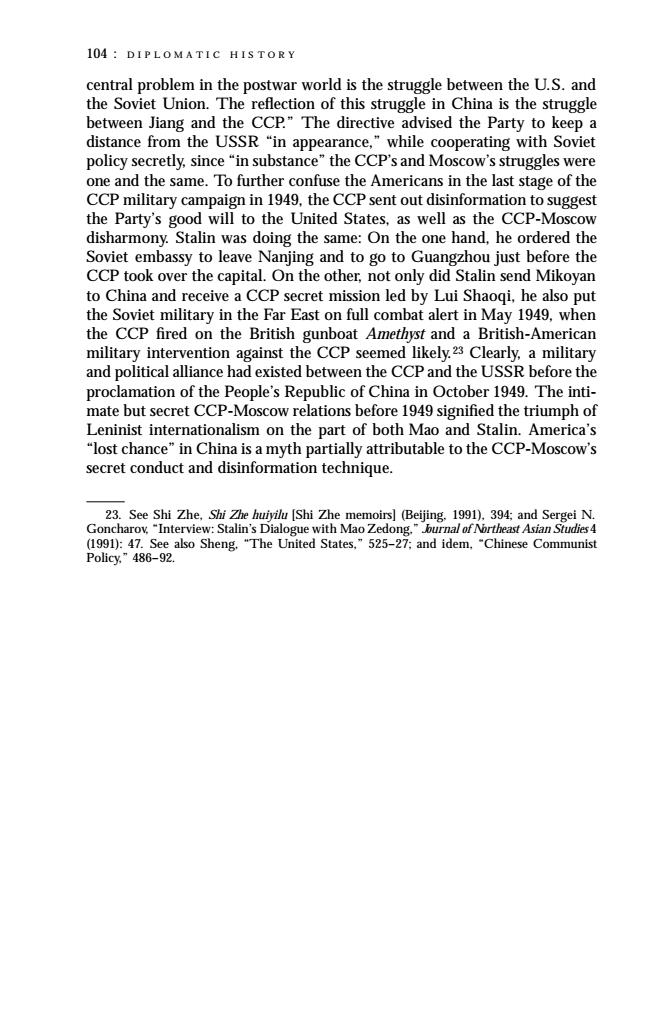正在加载图片...

104:DIPLOMATIC HISTORY central problem in the postwar world is the struggle between the U.S.and the Soviet Union.The reflection of this struggle in China is the struggle between Jiang and the CCP."The directive advised the Party to keep a distance from the USSR "in appearance,"while cooperating with Soviet policy secretly,since"in substance"the CCP's and Moscow's struggles were one and the same.To further confuse the Americans in the last stage of the CCP military campaign in 1949,the CCP sent out disinformation to suggest the Party's good will to the United States,as well as the CCP-Moscow disharmony.Stalin was doing the same:On the one hand,he ordered the Soviet embassy to leave Nanjing and to go to Guangzhou just before the CCP took over the capital.On the other,not only did Stalin send Mikoyan to China and receive a CCP secret mission led by Lui Shaoqi,he also put the Soviet military in the Far East on full combat alert in May 1949,when the CCP fired on the British gunboat Amethyst and a British-American military intervention against the CCP seemed likely.23 Clearly,a military and political alliance had existed between the CCP and the USSR before the proclamation of the People's Republic of China in October 1949.The inti- mate but secret CCP-Moscow relations before 1949 signified the triumph of Leninist internationalism on the part of both Mao and Stalin.America's "lost chance"in China is a myth partially attributable to the CCP-Moscow's secret conduct and disinformation technique. 23.See Shi Zhe,Shi Zhe huiyilu [Shi Zhe memoirs](Beijing.1991).394:and Sergei N. Goncharov,"Interview:Stalin's Dialogue with Mao Zedong."burnal of Northeast Asian Studies4 (1991):47.See also Sheng."The United States,"525-27:and idem."Chinese Communist Policy.”486-92.104 : D I P L O M A T I C H I S T O R Y central problem in the postwar world is the struggle between the U.S. and the Soviet Union. The reflection of this struggle in China is the struggle between Jiang and the CCP.” The directive advised the Party to keep a distance from the USSR “in appearance,” while cooperating with Soviet policy secretly, since “in substance” the CCP’s and Moscow’s struggles were one and the same. To further confuse the Americans in the last stage of the CCP military campaign in 1949, the CCP sent out disinformation to suggest the Party’s good will to the United States, as well as the CCP-Moscow disharmony. Stalin was doing the same: On the one hand, he ordered the Soviet embassy to leave Nanjing and to go to Guangzhou just before the CCP took over the capital. On the other, not only did Stalin send Mikoyan to China and receive a CCP secret mission led by Lui Shaoqi, he also put the Soviet military in the Far East on full combat alert in May 1949, when the CCP fired on the British gunboat Amethyst and a British-American military intervention against the CCP seemed likely.23 Clearly, a military and political alliance had existed between the CCP and the USSR before the proclamation of the People’s Republic of China in October 1949. The intimate but secret CCP-Moscow relations before 1949 signified the triumph of Leninist internationalism on the part of both Mao and Stalin. America’s “lost chance” in China is a myth partially attributable to the CCP-Moscow’s secret conduct and disinformation technique. 23. See Shi Zhe, Shi Zhe huiyilu [Shi Zhe memoirs] (Beijing, 1991), 394; and Sergei N. Goncharov, “Interview: Stalin’s Dialogue with Mao Zedong,” Journal of Northeast Asian Studies 4 (1991): 47. See also Sheng, “The United States,” 525–27; and idem, “Chinese Communist Policy,” 486–92